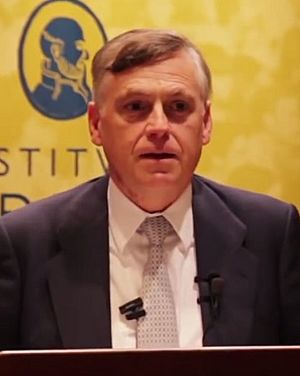Jesús Huerta de Soto facts for kids
Quick facts for kids
Jesús Huerta de Soto
|
|
|---|---|

Jesús Huerta de Soto in 2014
|
|
| Born | 23 December 1956 Madrid, Spain
|
| Institution | Universidad Rey Juan Carlos |
| Field | Political economics |
| School or tradition |
Austrian School |
| Awards | King Juan Carlos International Prize for Economics, Adam Smith Prize, Franz Kuechel Prize for Excellence in Economic Education |
Jesús Huerta de Soto Ballester (born December 23, 1956) is a Spanish economist. He is known for his work in the Austrian School of economics. He teaches economics at King Juan Carlos University in Madrid, Spain.
Contents
About Jesús Huerta de Soto
His Education and Career
Jesús Huerta de Soto studied economics at Complutense University of Madrid. He earned his first degree in economics in 1978. Later, he received his PhD in economics from the same university in 1992. He also earned an MBA degree from Stanford University in 1985.
In 2000, he became a full professor of economics at King Juan Carlos University. Since 2007, he has been in charge of a special program there. This program teaches about the Austrian School of economics.
Huerta de Soto also helped edit many books by a famous economist named F. A. Hayek. He is part of the team that guides several economic journals. He is also a Senior Fellow at the Mises Institute, which is a group that studies economics.
His Ideas on Economics
Classical Liberalism and Government Power
Jesús Huerta de Soto believes in a type of economic thinking called classical liberalism. This idea focuses on individual freedom and limited government. However, he thinks that classical liberals have not been able to truly limit the power of the government.
Understanding Economic Balance
Some economists talk about "general equilibrium theory." This idea tries to explain how all parts of an economy balance out. Huerta de Soto has said that this way of thinking is not very helpful. He believes it focuses on ideas that don't really exist in the real world.
Banks and Money: Full-Reserve Banking
Huerta de Soto strongly supports an idea called full-reserve banking. In this system, banks would have to keep 100% of the money deposited with them. This means they could not lend out money that people have deposited. He believes this would stop banks from creating new credit.
In 2006, he wrote a long book about this topic. It was published in English as Money, Bank Credit, and Economic Cycles. Many people have reviewed his book. Some say it is very detailed and important. They believe it will become a classic book in economics.
However, some reviewers have different opinions. One reviewer, Larry J. Sechrest, said that Huerta de Soto tries to prove that banks lending out money they don't fully hold is wrong. Sechrest also said that Huerta de Soto doesn't consider that bank customers might be okay with some risk. This risk comes from banks lending out their money.
Huerta de Soto argues that most people don't fully understand how banks work. He believes they think their money is always safe and guaranteed. He points to times when people rioted because banks stopped payments. He sees this as proof that people don't truly agree to the risks of current banking systems.
The School of Salamanca
Experts Andre Azevedo Alves and Jose Moreira have said that Huerta de Soto has given a very complete look at banking ideas. These ideas come from a group of thinkers called the School of Salamanca. This was a group of scholars from Spain in the 16th century.
Awards and Honors
Jesús Huerta de Soto has received special honorary doctorates from several universities:
- Universidad Francisco Marroquín (2009)
- Alexandru Ioan Cuza University (2010)
- Finance University under the Government of the Russian Federation (2011)
See also
 In Spanish: Jesús Huerta de Soto para niños
In Spanish: Jesús Huerta de Soto para niños

